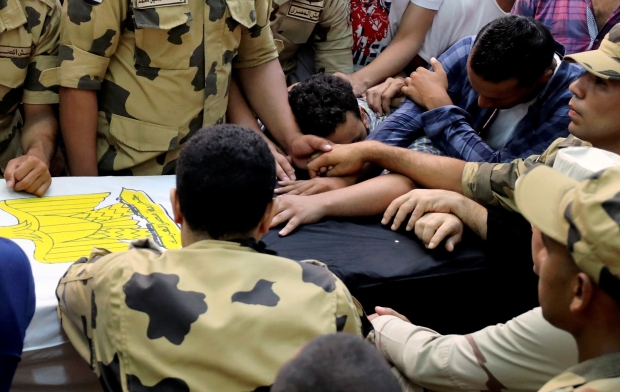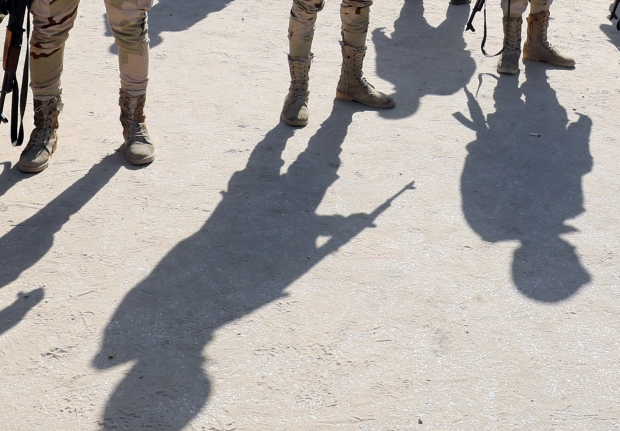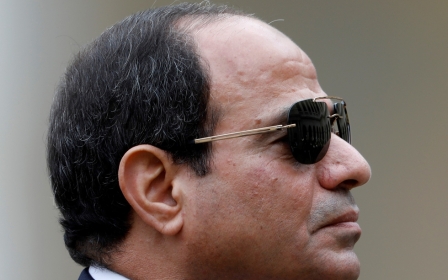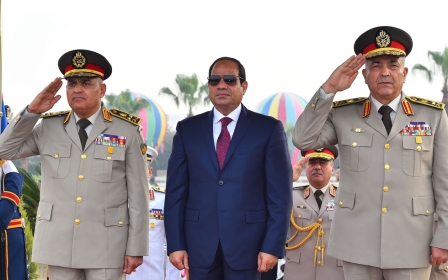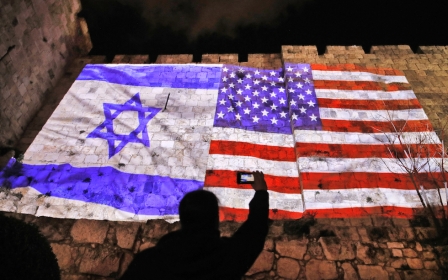Israel's worst kept secret: An embarrassing alliance with Egypt in Sinai
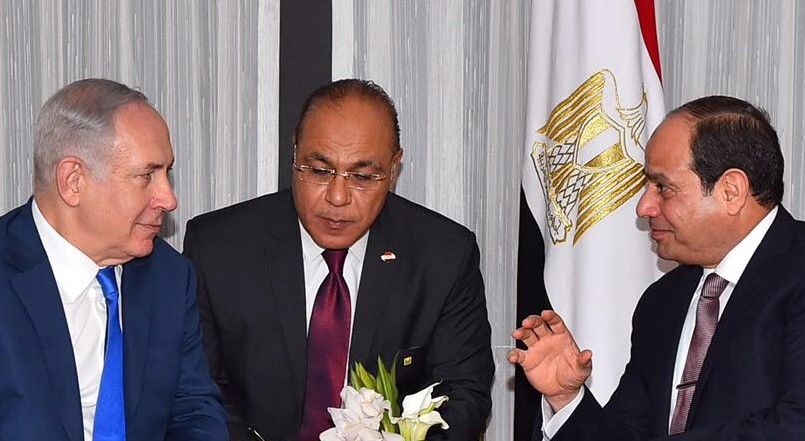
Last week, the New York Times' Cairo bureau chief, David Kirkpatrick, published a purported expose of a hitherto secret Israeli campaign against Islamist insurgents in the northern Sinai.
Since 2011, the militants, who were an amalgam of disgruntled Bedouin and Islamic State (IS) operatives, had launched attacks both against targets on a southern highway near Eilat and against Egyptian military targets in northern Sinai.
Clearly, the NYT sources didn't follow the entire history of Israeli involvement in the Sinai
Kirkpatrick noted the great pains taken by both the Egyptians and Israelis to conceal their joint efforts. He asserts in two places in the report that Israeli media could not report most of the attacks because of military censorship.
He pointed to one Israeli drone strike in 2013 which killed five Islamist fighters, as if this was the first of the joint attacks in Sinai. But it wasn't. The first such drone assault which killed a Sinai Islamist was in 2012.
Then he added: "It was…in late 2015, that Israel began its wave of air strikes, the American officials said, which they credit with killing a long roster of militant leaders." This, too, is imprecise, at best, although the details of the actual Israeli operations portrayed and the underlying reasons for the Israel-Egypt alliance are accurate.
Israel's worst kept secret
If the Israeli military intervention in Sinai was secret, it was one of the worst-kept secrets as far as Israel is concerned. No less a figure than Israeli Prime Minister Benjamin Netanyahu himself in 2016 bragged at a Likud Party meeting about the daring steps Israel was taking to protect itself from "the Sinai terrorists".
Though it's true the Israeli military censor suppressed reporting about the prime minister's speech, by then it had appeared on the TV news and was featured on YouTube.
While it is true that the Israelis prefer strongmen generals running the show to Islamists like Morsi, the fact is that Israel saw these Islamists in Sinai as a threat before Abdel Fattah al-Sisi came to power.
Steven A Cook, the Eni Enrico Mattei senior fellow for Middle East and Africa studies at the Council on Foreign Relations, told me: "When Morsi was in power, the Egyptian presidency left the Israel file to General Intelligence and the Ministry of Defense. It is plausible that the Israelis and Egyptian security forces were coordinating without Morsi knowing it, which was likely OK with him."
Cooke also pointed out that the commentary around the NYT article has made the Sisi-era Egypt-Israel coordination into a bigger deal militarily than it is. "The Egyptians have carried out probably thousands of strikes whereas the Israeli number is no doubt much lower."
Kirkpatrick also said: "It is unclear if any Israeli troops or special forces have set foot inside Egyptian borders, which would increase the risk of exposure."
This, too, is not correct. In 2011, in one of the most daring attacks originating from the Sinai, fighters crossed the border into Israel and raked heavy fire on a southern highway near Eilat. A bus and several civilian vehicles came under attack and seven Israelis were killed including a soldier.
Israel has not stopped -or even significantly impeded- the Islamist insurgency. If anything, it has only put a dent in it, and a fairly small one at that
Afterward, the attackers slipped back across the Egyptian border pursued by Israeli military and Border Police. Meanwhile, Egyptian security forces were hunting down the militants as well. When the two forces met, the Israelis opened fire on the Egyptian police, killing five.
Egypt quickly swept the matter under the rug. No Egyptian media reported that its own troops were killed by Israeli forces which had invaded Egypt in order to track down Sinai terrorists. Then prime minister Ehud Barak issued an apology and everything was hunky-dory.
Alex Fishman reported Israel's violation of Egyptian sovereignty in the Israeli daily, Yediot Achronot. Israeli blogger Idan Landau published a hard-hitting series of exposes as well. I published a number of blog posts on the subject as well, beginning in 2011.
The most trusted source
There were other Israeli incursions into Egypt. The Mossad kidnapped a Palestinian, Wael Abu Rida, in the Sinai and imprisoned him in Israel. Though Egyptian intelligence cooperated with the apprehension, Israeli agents were inside Egyptian territory and facilitated the operation there.
In 2012, I also reported that Israeli soldiers were crossing the Egyptian frontier in order to stem the flow of African refugees entering Israel via the Sinai.
How do I know all this? Because until 2014, a retired Israeli general and defence minister was my most trusted source in reporting stories about Israeli national security affairs. I could not reveal his identity until, just before his death in 2016, he permitted me to do so.
I am doing so here for the first time. He was Binyamin Ben-Eliezer.
Ben-Eliezer rose to one of the highest ranks in the Israeli army, brigadier general. Along the way, controversy dogged him as his forces were accused of massacring 250 Egyptian POWs during the 1967 war, although he was by no means the only Israeli officer charged with permitting such war crimes.
After he retired, he entered political life in the Labor Party and rose to the highest ranks, becoming defence minister under Ariel Sharon in 2001. He was especially close politically to Barak, but after the latter lost the 2000 election to Sharon's Likud, Labor began a slow decline.
Ben-Eliezer later drifted away from Barak's orbit and left politics altogether in 2014. By then, he was suffering from kidney failure and faced corruption charges filed by Israeli police.
But in the four years preceding, he offered me scores of scoops on major stories which could not be published in Israel due to judicial gag orders or military censorship.
It was Ben-Eliezer who came to me with the story of the first Israeli drone attack in Sinai in 2012. He also revealed to me the lies both Egypt and Israel were proffering the media about the terror attack in southern Israel mentioned above.
These lies were necessitated by the fact that Israel was embarrassed by the ease with which the Sinai fighters penetrated its defences; and Egypt was embarrassed that Israeli troops penetrated its territory and killed five of its own security personnel.
Here is a recounting of some of the stories related to Israel's campaign in the Sinai and burgeoning relationship with Egypt published before 2015: Israel's first Sinai drone strike killed a Bedouin militant (2012); Israeli violates Egyptian sovereignty killing four Sinai militants (2013); Israel and Egypt’s Junta: Birds of a Feather (2013); Israel encouraged Egyptian military coup and urged generals not to negotiate away their power in its aftermath (2013).
The wrong narrative
Clearly, the NYT sources didn't follow the entire history of Israeli involvement in the Sinai. They knew part of the story, and weaved those facts together to create a narrative to advance their interests.
What were US interests? You will find that NYT piece emphasises the budding alliance between Egypt's military rulers and Israel in the context of the increasingly close relationship between Israel and the Sunni states led by Saudi Arabia.
The piece also amplifies the value of the Egypt-Israel joint military operations, claiming Israeli anti-terror operations have stemmed the tide of Islamist violence which might have otherwise toppled the military junta.
However, this argument has gone too far. Israel has not stopped or even significantly impeded the Islamist insurgency. If anything, it has only put a dent in it, and a fairly small one at that. IS wages almost daily attacks there against both military and civilian targets.
As this Haaretz report notes, the brutal and corrupt nature of the Egyptian rule is not something an Israeli missile or jet can fix. Israel cannot singlehandedly maintain Sisi in power. Eventually, he will go the way of Mubarak before him, with or without Israeli support.
If a truly democratic or populist figure ever comes to power in Egypt, both he and the Egyptian people will remember it was Israel that helped the corrupt and murderers maintain their hold on power.
Similarly, when the House of Saud is someday overthrown, whoever replaces it will remember the corrupt alliance forged between a corrupt, kleptocratic monarchy and its Israeli allies.
Dictatorship's short shelf life
It's astonishing that the US is seeking to tell such a warped, twisted narrative. Contrary to what US and Israeli intelligence would have us believe, it is not a good thing that Israel is forging these alliances with the most corrupt, repressive elements of the Arab world.
If it helps Israeli interests at all, it will only be in the short-run. Dictatorships and military strongmen have a limited shelf life in this part of the world, as recent events have shown. Once they are toppled, those who follow will not view Israel so favourably.
But in stories like these, involving tremendous amounts of dissembling, obfuscation and opacity by politicians and intelligence officials, it doesn't work.
Reporters and their editors must recognise that in closed societies like Egypt and Israel (yes, for all you liberal folk out there, even Israel), critical information comes from non-conventional sources that should be treated with the same respect reserved for sources the mainstream media considers kosher.
In a society like Israel, which imposes criminal sanctions on whistleblowers and other forms of dissent from the security consensus, journalistic standards must take this into account.
- Richard Silverstein writes the Tikun Olam blog, devoted to exposing the excesses of the Israeli national security state. His work has appeared in Haaretz, the Forward, the Seattle Times and the Los Angeles Times. He contributed to the essay collection devoted to the 2006 Lebanon war A Time to Speak Out (Verso) and has another essay in the upcoming collection Israel and Palestine: Alternate Perspectives on Statehood (Rowman & Littlefield).
The views expressed in this article belong to the author and do not necessarily reflect the editorial policy of Middle East Eye.
Photo: Egyptian President Abdel Fattah al-Sisi (R) speaks with Israeli Prime Minister Benjamin Netanyahu (L) during their meeting as part of an effort to revive the Middle East peace process ahead of the United Nations General Assembly in New York, US, September 19, 2017 (REUTERS)
This article is available in French on Middle East Eye French edition.
New MEE newsletter: Jerusalem Dispatch
Sign up to get the latest insights and analysis on Israel-Palestine, alongside Turkey Unpacked and other MEE newsletters
Middle East Eye delivers independent and unrivalled coverage and analysis of the Middle East, North Africa and beyond. To learn more about republishing this content and the associated fees, please fill out this form. More about MEE can be found here.



